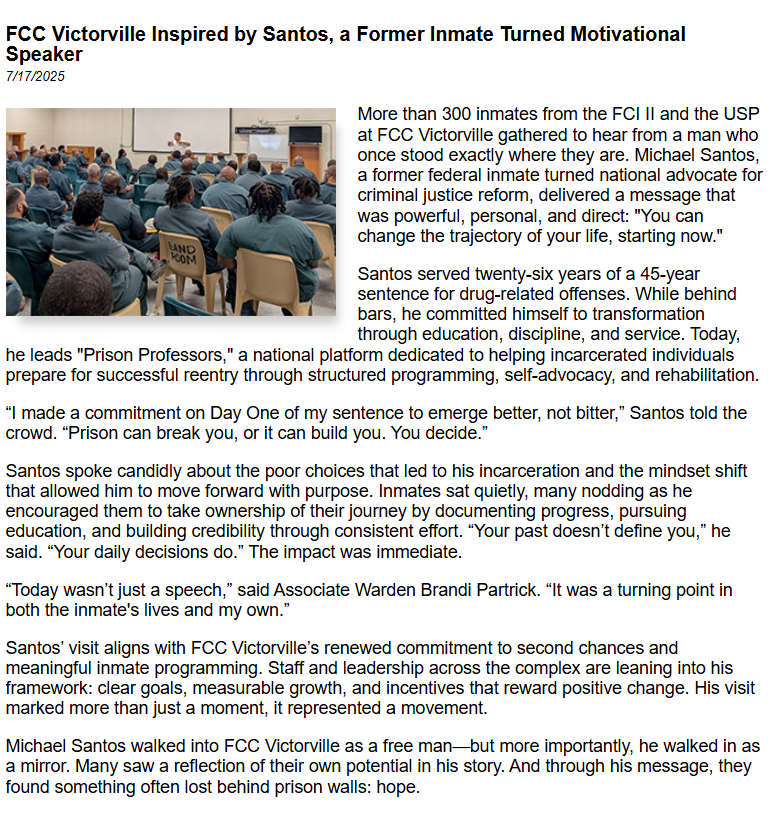On July 17, 2025, I got the privilege of visiting the Federal Correctional Complex in Victorville—not as an inmate, but as a free man on a mission. More than 300 people serving sentences there, in FCI II and USP Victorville gathered to hear a message I’ve spent decades preparing to deliver:
- Anyone can build a better future for themselves
That message didn’t come from theory. It came from lived experience—born in the depths of a prison cell, refined through decades of discipline, and brought to life through education, service, and advocacy.

Beginning in Solitary
At the start of my sentence, while locked in solitary confinement, I was fortunate to get inspired by many leaders. They helped me realize that I could work toward building a better future. I simply needed a plan, and then, to execute the plan with commitment.
I read the autobiography of Mahatma Gandhi, and his words ignited a fire within me. Gandhi taught that to change the world, we must begin by changing ourselves. I embraced that principle fully. I decided that if I ever had the opportunity to reach others, I would work tirelessly to help transform the culture of confinement.
It’s been more than three decades since I made that vow. Since learning from leaders like him, I began a path of living that message.
Sowing Seeds for Systemic Change
Changing outcomes for people in prison would require more than good intentions. It would require action—sustained, strategic, and purposeful action.
I began sowing seeds early in my sentence by pursuing an education, earning undergraduate and graduate degrees while incarcerated. I documented my journey, not just for the sake of personal development, but to build a body of work that could inspire and guide others. Over time, I gained support from mentors, educators, and advocates who believed in this vision.
When I walked out of prison after serving a 45-year sentence, I didn’t leave the system behind. I left with a mission: to help more people in prison prepare for success and earn their way to freedom through merit.
Those efforts helped build momentum behind criminal justice reform—including legislation like the First Step Act, which offers incentives for rehabilitation and early release for those who work to improve themselves.
A Message of Hope in Victorville
Returning to FCC Victorville as a speaker, I carried with me more than a speech—I carried a lifetime of preparation. I spoke candidly about my journey, the mindset shift that allowed me to turn adversity into opportunity, and the daily disciplines that shaped my life. I encouraged every person in that room to take ownership of their path by documenting their progress, pursuing education, and building credibility through consistent action.
"Prison can break you, or it can build you. You decide."
I was deeply moved to see the impact in real time. People listened, reflected, and expressed enthusiasm for participating. Many saw in me a reflection of their own potential. Associate Warden Brandi Partrick later said, “Today wasn’t just a speech. It was a turning point in both the inmates’ lives and my own.” That’s the power of hope. That’s the power of purpose.
What Comes Next: A Vision for the Future
Speaking at Victorville was not the destination—it was a milestone on a much longer path. Along with our team, I’m working to bring this message to prisons across the country. With support from staff and leadership throughout the Bureau of Prisons, I aim to help shape a new culture—one rooted in accountability, education, and opportunity.
But the vision doesn’t stop there.
I’m also working to help develop filters that the BOP can use to assess who is truly worthy of going home early. Who has worked hard? Who has demonstrated growth? Who has earned a second chance?
This will be a step-by-step process. It won’t happen overnight. But with every visit, every course, and every documented success story, we move closer to a system that rewards merit and builds stronger communities—inside and outside the walls.
A Personal Note
To everyone in the Bureau of Prisons—leaders, staff, and the incarcerated people striving for change—I want you to know how honored I am to contribute to this mission. This work is the fulfillment of a dream born in silence, behind walls, during a time when hope felt distant.
Now, I see the seeds I once planted beginning to bear fruit. And I promise to keep sowing, keep advocating, and keep building until every person who wants to change has the tools, the guidance, and the opportunity to do so.
We can do better. We must do better. And together, we will.
